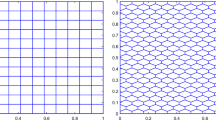Abstract
In this paper, we prove the convergence of an adaptive finite element method for optimal control problems on \(L^{2}\) errors by keeping the meshes sufficiently mildly. In order to keep the meshes sufficiently mildly we need increasing the number of elements that are refined, moreover, we find that it will not compromise the quasi-optimality of the AFEM. In other words, we prove the quasi-optimality of the adaptive finite element algorithm in the present paper. In the end, we conclude this paper with some conclusions and future works.
Similar content being viewed by others
References
Babus̃ka, I., Rheinboldt, W.C.: Error estimates for adaptive finite element computations. SIAM J. Numer. Anal. 15, 736–754 (1978)
Dörfler, W.: A convergent adaptive algorithm for Poissons equation. SIAM J. Numer. Anal. 33, 1106–1124 (1996)
Morin, P., Nochetto, R.H., Siebert, K.G.: Data oscillation and convergence of adaptive FEM. SIAM J. Numer. Anal. 38, 466–488 (2000)
Morin, P., Nochetto, R.H., Siebert, K.G.: Convergence of adaptive finite element methods. SIAM Rev. 44, 631–658 (2002)
Morin, P., Nochetto, R.H., Siebert, K.G.: Local problems on stars: a posteriori error estimates convergence, and performance. Math. Comput. 72, 1067–1097 (2003)
Morin, P., Siebert, K.G., Veeser, A.: A basic convergence result for conforming adaptive finite elements. Math. Models Methods Appl. 18, 707–737 (2008)
Chen, Z., Feng, J.: An adaptive finite element algorithm with reliable and efficient error control for linear parabolic problems. Math. Comput. 73, 1167–1193 (2004)
Mekchay, K., Nochetto, R.H.: Convergence of adaptive finite element methods for general second order linear elliptic PDEs. SIAM J. Numer. Anal. 43, 1803–1827 (2005)
Cascon, J.M., Kreuzer, C., Nochetto, R.H., Siebert, K.G.: Quasi-optimal convergence rate for an adaptive finite element method. SIAM J. Numer. Anal. 46, 2524–2550 (2008)
Binev, P., Dahmen, W., Devore, R.: Adaptive finite element methods with convergence rates. Numer. Math. 9, 219–268 (2004)
Stevenson, R.: Optimality of a standard adaptive finite element method. Found. Comput. Math. 7, 245–269 (2007)
Chen, L., Holst, M., Xu, J.C.: Convergence and optimality of adaptive mixed finite element methods. Math. Comput. 78, 35–53 (2009)
Carstensen, C., Hoppe, R.H.W.: Error reduction and convergence for an adaptive mixed finite element method. Math. Comput. 75, 1033–1042 (2006)
Carstensen, C., Gallistl, D., Schedensack, M.: Quasi-optimal adaptive pseudostress approxoimation of the Stokes equations. SIAM J. Numer. Anal. 51, 1715–1734 (2013)
Becker, R., Mao, S.P., Shi, Z.C.: A convergence nonconforming adaptive finite element method with quasi-optimal complexity. SIAM J. Numer. Anal. 47, 4639–4659 (2010)
Becker, R., Mao, S.P.: Quasi-optimality of adaptive nonconforming finite element methods for the Stokes equations. SIAM J. Numer. Anal. 49, 970–991 (2011)
Becker, R., Kapp, H., Rannacher, R.: Adaptive finite element methods for optimal control of partial differential equations: basic concept. SIAM J. Control Optim. 39, 113–132 (2000)
Demlow, A., Stevenson, R.: Convergence and quasi-optimality of an adaptive finite element method for controlling \(L^{2}\) errors. Numer. Math. 117, 185–218 (2011)
Liu, W.B., Yan, N.N.: A posteriori error analysis for convex distributed optimal control problems. Adv. Comp. Math. 15, 285–309 (2001)
Liu, W.B., Yan, N.N.: A posteriori error estimates for convex boundary control problems. SIAM J. Numer. Anal. 39, 73–99 (2001)
Liu, W.B., Yan, N.N.: A posteriori error estimates for optimal problems governed by Stokes equations. SIAM J. Numer. Anal. 40, 1850–1869 (2003)
Chen, Y., Liu, W.B.: A posteriori error estimates for mixed finite element solutions of convex optimal control problems. J. Comput. Appl. Math. 211, 76–89 (2008)
Chen, Y., Liu, L.L., Lu, Z.L.: A posteriori error estimates of mixed methods for parabolic optimal control problems. Numer. Funct. Anal. Optim. 31, 1135–1157 (2010)
Hou, T.L., Chen, Y., Huang, Y.Q.: A posteriori error estimates of mixed methods of quadratic optimal control problems governed by parabolic equations. Numer. Math. Theory Methods Appl. 4, 439–458 (2011)
Li, R., Liu, W.B., Ma, H.P., Tang, T.: Adaptive finite element approximation for distributed elliptic optimal control problems. SIAM J. Control Optim. 41, 1321–1349 (2002)
Gaevskaya, A., Hoppe, R.H.W., Iliash, Y., Kieweg, M.: Convergence analysis of an adaptive finite element method for distributed control problems with control constraints. Int. Ser. Numer. Math. 155, 47–68 (2007)
Kohls, K., Rösch, A., Siebert, K.G.: Convergence of adaptive finite elements for control constraints optimal control problems, preprint-Nr.: SPP1253-153 (2013)
Kohls, K., Rösch, A., Siebert, K.G.: A posteriori error analysis of optimal control problems with control constraints. SIAM J. Control Optim. 52, 1832–1861 (2014)
Gong, W., Yan, N.N.: Adaptive finite element method for elliptic optimal control problems: convergence and optimality, preprint arXiv: 1505.01632 (2015)
Verfürth, R.: A Review of a Posteriori Error Estimation and Adaptive Mesh-Refinement Techniques. Wiley-Teubner, Chichester (1996)
Lions, J.L.: Optimal Control of Systems Governed by Partial Differential Equations. Springer, Berlin (1971)
Ge, L., Liu, W.B., Yang, D.P.: \(L^{2}\) norm equivalent a posteriori error estimate for a constrained optiaml control problem. Int. J. Numer. Anal. Model. 6, 335–353 (2009)
Author information
Authors and Affiliations
Corresponding author
Additional information
This work is supported by National Science Foundation of China (11671157, 91430104).
Rights and permissions
About this article
Cite this article
Leng, H., Chen, Y. Convergence and Quasi-Optimality of an Adaptive Finite Element Method for Optimal Control Problems on \(L^{2}\) Errors. J Sci Comput 73, 438–458 (2017). https://doi.org/10.1007/s10915-017-0425-8
Received:
Revised:
Accepted:
Published:
Issue Date:
DOI: https://doi.org/10.1007/s10915-017-0425-8




